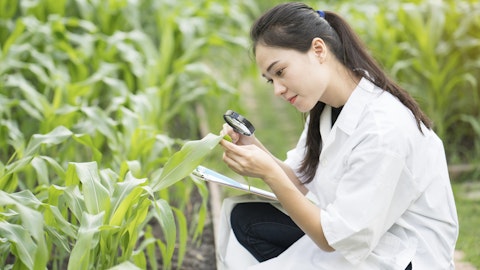For the biofuel market, we hold a leadership position in engineered Camelina and look forward to continue to support Vision [ph] and progressing business development opportunities to secure revenue from R&D services and our license option agreements for our technologies. In ’23, our team did an outstanding job supporting the regulatory approval of advanced Camelina varieties developed using genetic engineering. With that in hand, for the first time, growers will have access to HT Camelina with elite weed control. In ’24, we plan to generate data for the self determination of the safety of HT Camelina meal and animal feed. This activity will support higher market value for the meal as the production scale grows. With multiple milestones met in ’23 and several milestones already achieved in ’24, this is an exciting time for Yield10.
With the experience we now have with the new regulatory process for engineered crops in the US, we see tremendous potential to deploy our advanced gene traits and edits to continually improve the value of Camelina for growers, expand the acreage, and increase margins for omega-3 products. With that, I’d like to turn the call back over to Lynne for questions.
Lynne Brum: Thanks, Oli. Alicia, we’re now ready for questions.
Q – Unidentified Analyst: Hi, this is actually Jeremy on the line for Anthony. Just two quick questions. One is if you’re focused now, you’re shifting towards the omega-3 off from the actual Camelina as opposed to the biofuels. Is that, can we assume that, the talks that you mentioned, in the letter in the LOIs and MOUs with Marathon Petroleum and Mitsubishi, are those still in. And are you still in talks with those or those sort of petered out and the focus you think there’s a better opportunity in omega-3s?
Oliver Peoples: Hi, Jeremy. Thanks for sticking – asking the question. So, fundamentally, ever since we sort of started focusing Camelina, which I believe was appeared for the first time in 10-K in 2019 2020, we clearly proposed that we saw the biofuel market as a way to build an operating business and transition over to the higher value products, recognizing that for biofuels, ultimately that’s going to be a large scale business requiring a tremendous amount of operating capital. And so what we mentioned as a product is obviously omega-3s and the future of HA bioplastics [ph] What really has happened is, I think, the opportunity arose to enter the omega-3 business faster. We are still in discussions with multiple players in the biofuel space.
There’s still strong interest, but right now the industry is basically seeing some uncertainty in the regulations at LCFS in California, number one, and number two, there’s a surplus of soybean oil at the moment, which won’t be sort of used up until additional biofuel capacity comes online going forward. So there’s sort of a, I wouldn’t say it’s not quite, it’s just things are in a kind of a hold pattern right at this time. And I think we see tremendous potential for biofuels in the future, but really the best way for us to facilitate the scale-up of this is to do exactly what we did with Vision. They are better funded based on their ownership of being Shell Oil, and they are clearly highly motivated to develop alternative oil seeds as a source of biofuels.
As we expand acreages, we expect to continue the discussions with others, and hopefully we’ll enter into additional agreements, including R&D service agreements for those markets, while we focus on building an operating business to produce and sell omega-3s.
Unidentified Analyst: I understand, yeah, that’s really helpful. You’re just, you’re basically, you’re going to apply your resources to where you think the nearest term opportunity is. That makes a lot of sense. And then actually, so just switching to that, you know, the production of omega-3s, you know, you mentioned on the call, and I see in the slide deck, there’s four possible uses for the, from the oil, the aquafeed, pet food, nutraceutical, and pharmaceuticals. Are you agnostic to what, you know, how you would end up using them? Obviously, it seems like aquafeed seems to be the biggest mark that might be the overall, the most potential revenue. But, you know, if you would get a deal with one of the other potential outputs, would you, you know, would you take that as well?
Oliver Peoples: Yeah, so, you know, I think you’re raising a very fair point, and that is, you know, obviously, aquafeed is the largest market for those things, but it is, that market’s fairly tightly linked to fish oil pricing. There are other higher value markets which require, you know, additional work to be done on the oil before you get into those markets. Things like concentrating into, you know, all these omega-3 concentrates, or making derivatives for pharma. But the big markets are basically aquafeed, pet food is very large and also growing. And that’s also the simplest market from the perspective of, you know, basically the oil that’s produced in Camelina today is actually a very good drop-in replacement for fish oil.
So there’s not a lot of additional development work to be done on the product. The production we have to scale up, but the product itself we know works. And so, you know, we see this as a, I guess that the way I look at this over the long term is by working initially in aquafeed and building a very solid operating foundation with good revenues and margins, we’ll be able over time to deliver the lowest cost, to have the lowest cost of production. And ultimately the business can decide what other markets it wants to enter into. Having said all of that, we have been and continue to be in discussions with players in all of those markets I mentioned. We have had a lot of inbound inquiries since we announced the option was being exercised with players interested in accessing new sources of omega-3s.
That includes aquafeed, pet food, human nutrition, and pharmaceuticals. We’ve had inbound inquiries from major players in those sectors across the board.
Unidentified Analyst: Okay, understood. Great. Thank you so much for that extra information and I’ll hop back in the queue.
Lynne Brum: Thank you, Jeremy.
Operator: Thank you. Our next question comes from the line of Ben Klieve with Lake Street Capital Market. Please proceed with your question.
Ben Klieve: All right, thanks for taking my questions. First, I have a couple questions on the relationship with Vision Bio. First of all, I’m hoping you can clarify for me the expected timing of the $3 million payment. It’s a little unclear to me. Is this an upfront payment that you guys expect, you know, in the immediate term or is this something that’s going to be delivered in installments here over the three-year period of the agreement?
Oliver Peoples: No, the majority of that money already came in and then there’s a couple of milestone, you know, very near-term milestones for the rest of it. So, no, it should all be in shortly. The majority already came in.
Ben Klieve: Okay, very good. Thank you. And then, kind of a bigger picture question around your expectations for royalty income here. You know, beyond that initial $3 million, can you give any kind of general goalpost for your expectations here as Vision ramps production over the next 2.5 years here?
Oliver Peoples: No. I think in reality, Vision’s got, like us, there’s quite a bit of work to do to wrap this up from where it is today. Basically right now we can’t disclose what Vision’s doing, but obviously they’re going to go about this in a very systematic in sensible [ph] way. And so it’s very difficult to give projections. The reality of it is, if this was roundup ready soybean we developed back in 1996 where there was 75 million acres of commercial production, it would be relatively easy. But the challenge here, of course, is that there isn’t 75 million acres of Camelina today. That acreage has to be established. And so that’s really part of the reason we shifted the focus to licensing other parties who are really, you know, have the depth and wherewithal to really scale this. And that’s something we’re going to continue to do beyond, beyond the original agreement with Vision. So that’s where we are.
Ben Klieve: Got it, very good. And then one more for me and I’ll get back in queue around the potential partnerships in omega-3, at this point, are you open to negotiating with potential partners where upfront payments are not realized or is an upfront payment or some kind of direct investment from a potential partner something that’s mandatory at this point for you guys?
Oliver Peoples: No, I think in reality, I mean, I think it really depends on the partner and what does the partner bring to the table. You know, we’re looking at these relationships and clearly, you know, we share a common goal with these partner prospects and actually seeing this technology scaled and enabling a large scale new source of omega-3 for these markets. So we have a common goal in mind. Obviously we’re at different ends of the value chain, but yeah, no, I think we are pretty open minded about how this is done. I think ultimately it comes down to finding partners who are committed to assisting us to produce and use this over the long term. We haven’t specified nor are we going to provide any guidance on the specific terms of any agreement. We’re just not able to do that due to confidentiality. But basically we are pretty open minded about the right way to find the right partners and work with them in a way that works for them and works for us.
Ben Klieve: Got it. Okay, very good. Thanks for taking my questions. I’ll get back in queue.
Operator: Thank you…
Oliver Peoples: So just one final point on that, Ben, and that is obviously our preference in all of these partnerships is to see these partners as a source of non-dilutive funding. But fundamentally, some of these partners bring a lot more to the table in terms of validation of this product, and that’s also important to us as well.
Operator: Thank you. There are no further questions at this time. I’d like to turn the floor back over to Lynne Brum for closing comments.
Lynne Brum: Thank you, Alicia. And I’ll hand the call back to Oli.
Oliver Peoples: Thanks, Lynne. I’d like to thank everyone personally for joining us on the call tonight, and especially our shareholders for your continued support. I’d also really like to thank the entire team at Yield10. It’s obviously been a pretty challenging situation here over the last few months. The technology team has done an absolutely phenomenal job not only developing, but also getting these technologies deregulated. Chuck and our finance team have done a phenomenal job also getting our 10-K file today under somewhat challenging circumstances, given that our audit firm left us back in February. So overall, I’m very fortunate to be supported by a terrific team of people. I couldn’t be prouder of what they’ve accomplished. So thank you. Have a nice evening.
Lynne Brum: Thanks, Alicia.
Operator: Thank you. This concludes today’s call. You may disconnect your lines at this time. Thank you for your participation.+
Follow Yield10 Bioscience Inc. (NASDAQ:YTEN)
Follow Yield10 Bioscience Inc. (NASDAQ:YTEN)
Receive real-time insider trading and news alerts



